- Home
- Margaret Atwood
Wilderness Tips Page 21
Wilderness Tips Read online
Page 21
The restaurant, their usual, is a Spanish one, well above Bloor Street and far enough away from The World so that they don't expect to run into anyone from there. They arrive at it separately, Marcia first; Gus makes an entrance for her with his coat collar turned up, pausing in the doorway to do a furtive skulk. "I don't think I was followed," he says.
"Ian has his methods," says Marcia. "Maybe he's a Mountie in disguise. Or CIA, I wouldn't put it past him. Or maybe he's subverted the staff here. He used to be a waiter." This is untrue, but it's part of an ongoing series of theirs: the former jobs of Ian. (Washroom attendant. Numismatist. Gerbil breeder.)
"No!" says Gus. "So that's where he got his unctuous charm! Well, that's where I got mine. I did six months of it - in Soho, no less - back when I was a beardless youth. Never be rude to a waiter, darling. They'll spit on your steak in the kitchen."
Marcia orders a sangria, and settles her widening bottom thankfully into her chair. Here she can eat imported food without feeling like a traitor. She intends to order blood oranges if she can get them. Those, and garlic soup. If Eric cross-examines her later, her conscience will be clear.
Gus is Marcia's latest buddy, and mole, at the paper. Her latest and her last: the others have all been fired or have left. Gus himself is not one of the old guard. He was imported only a few months ago to edit the Entertainment section, in one more of Ian the Terrible's attempts to shore up the credibility of his eroding paper. Even Ian knows there's something wrong, but he's failed to make the connections: he's failed to realize that even businessmen have other interests, and also standards. They've figured out that you can no longer read The World to find out what's going on, only to find out what's going on inside Ian's head.
He made a mistake with Gus, though. Gus has his own ideas.
Gus is tall and barrel-shaped and has dark, curly hair. He might be in his mid-thirties, or even younger. He has square, white, even teeth, the same size all the way along, like Mr. Punch. This gives him a formidable grin. He is English and Jewish, both at once. To Marcia he seems more English; still, she isn't sure whether his full name is Augustus or Gustav or something else entirely. Possibly he is also gay: it's hard for her to tell with literate Englishmen. Some days they all seem gay to her, other days they all seem not gay. Flirtation is no clue, because Englishmen of this class will flirt with anything. She's noticed this before. They will flirt with dogs if nothing else is handy. What they want is a reaction: they want their charm to have an effect, to be reflected back to them.
Gus flirts with Marcia, lightly and effortlessly, almost as if it were piano practice; or that's what Marcia thinks. She has no intention of taking him seriously and making a fool of herself. Anyway, he's too young. It's only in magazines like True Woman that younger men take a severe erotic interest in older women without making invidious comparisons involving body parts. Marcia prefers her dignity, or she intends to prefer it if offered the choice.
Today Gus's flirtation takes the form of an exaggerated interest in Eric, whom he has never met. He wants to know all about Eric. He's found out that Eric's nickname at the paper is Eric the Red, and asks Marcia with false innocence if this has anything to do with Vikings. Marcia finds herself explaining that it's just the way The World people think: they think anyone who doesn't agree with them is a communist. Eric is not a communist; instead he's a sort of Tory, but not the kind they have in England. Not even the kind they have now in Canada: Eric thinks the Canadian Tory government is made up mostly of used-car salesmen on the make. He is outraged by the Prime Minister's two hundred new suits, not because there are two hundred of them but because they were ordered in Hong Kong. He thinks the taxpayers' money should go to local tailors.
Gus quirks an eyebrow, and Marcia realizes that this conversation is becoming too complicated. As a sort of joke, she says that Gus will never be able to understand Eric unless he studies the War of 1812. That is a war Gus clearly does not remember. He gets out of it by saying that he used to think "interesting Canadian" was an oxymoron, but that Eric is obviously an exception; and Marcia sees that what he is in search of is eccentricity, and that he has made the mistake of deciding that this is where Eric fits in. She is annoyed, and smiles and orders another drink to keep from showing it. Eric is not so eccentric. About a lot of things he's even right. This doesn't always make him less maddening, but Marcia does not like having him patronized.
Now Gus turns the full force of his attention onto Marcia herself. How does she manage monogamy? he wants to know. Monogamy is something Marcia and Eric have a reputation for, as others have a reputation for heavy drinking. Monogamy, Gus implies, is a curious anthropological artefact, or else a sort of heroic feat. "How do you do it?" he asks.
No, Marcia thinks, he is not gay. "I wasn't always monogamous," she wants to say. She did not get from one marriage to another along a tidy route. She got there by bad judgements, escapades, misery; Eric himself began as a tumultuous and improbable scuffle. But if she confesses to any of this Gus will only become nosy, or - worse - sceptical, and beg her to tell all. Then, when she does, he'll assume the polite, beady-eyed expression the English get when they think you're too quaint for words, or else boring as hell.
So Marcia avoids the subject, and entertains Gus in other ways. She trots out for him the story of the panties embroidered with the days of the week, and her mother's warnings about being run over by a bus. From there she goes on to construct for him the Canada of old; she describes the dark and dingy Toronto beer parlours with their evil-smelling Men Only sections, she describes the Sunday blue laws. Marcia isn't sure why she wants to make her country out as such a dour and Gothic place. Possibly she wants war stories, like other people. Possibly she wants to appear brave or stalwart, to have endured the rigours of citizenship in such a country. She is suspicious of her own motives.
She tells on, however. She describes Mackenzie King, the longest-ruling Canadian Prime Minister, deciding state policy with the help of his dead mother, who, he was convinced, was inhabiting his pet terrier. Gus thinks she's making this up, but no, she assures him, it's entirely true. There are documents.
This brings them to the end of the garlic soup. When the deep-fried calamari arrive, Gus takes his turn. What he has to offer is gossip about The World. "Ian the Terrible is trying to organize us into pods," he says. He looks delighted: he has something to add to the list of local absurdities he is compiling, for when he returns to England. He doesn't know yet that he will return, but Marcia knows. Canada will never be a real place for him.
"Pods?" says Marcia.
"As in killer whales," says Gus. "Three writers to a pod, with a pod leader. He thinks it will promote team spirit."
"He might as well write the whole paper all by himself," says Marcia, trying not to sound bitter. She thinks the pod idea is extremely stupid, but at the same time she is feeling left out, because she herself has not been included in a pod. She will miss out on something, some of the fun.
"He's working on it," says Gus. "He's cut back on the Letters to the Editor to make space for a new column, written by guess who?"
"No," says Marcia with dismay. "Called what?"
" 'My Opinionzzzz,' " says Gus, grinning his alarming grin. "No. I lie. 'The Snorey of My Life,' by Ian Emmiry."
"You're cruel," Marcia murmurs, trying to disguise her approval.
"Well, he deserves it. The man should be hanged for the wilful infliction of grievous terminal boredom. He wants the Entertainment section to put on a bun-fest called The Critical Forum. He thinks we should all come in on free overtime to listen to some mouldy old university professor rabbit on about how to keep from going stale. This is not a fabrication."
"My God," says Marcia. "What'll you do?"
"I'm egging him on," says Gus. "I smile, and smile, and am a villain."
"They won't stand for it," says Marcia.
"That's the general idea," says Gus, grinning from ear to ear. He's mobile. He does not have a mortgage, or child
ren, or monogamy.
Marcia has downed her second drink too quickly. Now she has lost the thread. Instead of listening, she is staring at Gus, imagining what it would in fact be like to have an affair with him. Too many witticisms, she thinks. Also, he would tell.
She looks at him, shining as he is with naughty pleasure, and all of a sudden she sees what he would have been like as a small boy. A ten-year-old. With that grin, he would have been the class joker. Nobody would have got the better of him, not even the bullies. He'd have known everyone's weak place, where to get the knife in. How to protect himself.
She often thinks this way about men, especially after a drink or two. She can just look at a face and see in past the surface, to that other - child's - face which is still there. She has seen Eric in this way, stocky and freckled and defiant, outraged by schoolyard lapses from honour. She has even seen Ian the Terrible, a stolid, plodding boy who must have known others thought of him as dull; she has seen him studying hard, hoping in vain for a best friend, storing up his revenges. It has helped her to forgive him, somewhat.
Marcia returns to the conversation. She seems to have missed several paragraphs: now Gus has switched focus and is talking about Noriega. "He's hiding out in the jungle," he says. "He's thumbing his nose at them. They'll never get him - he'll be off to Cuba or somewhere - and then it'll just be back to the old graft and squalor, with a brand-new CIA flunkey." He lifts his glass, signals for a refill. He's drinking white wine. "A year from now it'll all be fish-wrap."
Marcia thinks about Noriega, crouching in some tropical thicket or camped out in the hills. She remembers the newspaper photos of him, the round, ravaged, frozen-looking face, the face of a dogged scapegoat. When he was a child it would have been much the same. He would have had those blanked-out eyes very early; they would have been inflicted on him. This is what makes her a soppy columnist, she thinks - she does not believe that children are born evil. She is always too ready to explain.
Marcia goes to the washroom to deal with her overload of sangrias, and to redo her face. It is far later than she has thought. In the mirror she is shiny-eyed, with flushed cheeks; her hair flies out in dishevelled tendrils. From the side - she can just see, rolling her eyes - she has the makings of a double chin. Her first husband used to tell her she looked like a Modigliani; now she resembles a painting from a different age. A plump bacchante of the eighteenth century. She even looks a little dangerous. She realizes with some alarm that Gus is not out of the question, because she herself is not. Not yet.
Marcia force-marches herself up the stairs of the Bathurst station. For a moment she pictures what these squeaky-clean tiled tunnels would be like overgrown with moss or festooned with giant ferns; or underwater, when the greenhouse effect really gets going. She notices she is no longer thinking in terms of if - only of when. She must watch this tendency to give up, she must get herself under control.
By now it's after five; the three homeless men are gone. Maybe they will be there tomorrow; maybe she will talk with them and write a column about life on the street or the plight of Native people in the city. If she does, it will change little, either for them or for her. They will get a panel discussion, she will get hate mail. She used to think she had some kind of power.
It's dark and cold, the wind whistles past her; in the storefronts the Christmas decorations twinkle falsely. Mostly these are bells and tinsel; the angels and Madonnas and the babes in mangers have been downplayed as being not sufficiently universal. Or maybe they just don't sell things. They don't move the goods.
Marcia hurries north, not dawdling to look. Her bladder is bursting; it doesn't function the way it did; she shouldn't have had that last cup of coffee; she will disgrace herself on the street, like a child in a soggy-bottomed snowsuit, caught out on the way home from school.
When she reaches the house she finds the front steps thoughtfully strewn with kitty litter. Eric has been at work. This becomes more apparent when she rushes to the bathroom, only to find that the toilet paper has been removed. It's been replaced with a stack of newsprint oblongs, which she finds - once she is gratefully sitting and at last able to read - to consist of this morning's World business section, neatly scissored.
Eric is in the kitchen, humming to himself as he mashes the turnips. He did away with paper towels some time ago. He wears a white chef's apron, on which to wipe his hands. Earlier dinners have left their tracks; already from tonight's there are several cheerful smears of orange turnip.
The radio news is on: there is more fighting in Panama, there are more dead bodies, there is more rubble, and more homeless children wandering around in it; there are more platitudes. Conspiracy theories are blooming like roses. President Noriega is nowhere to be found, although much is being made of the voodoo paraphernalia and the porn videos that are said to litter his former headquarters. Marcia, having ghost-written the lives of other politicians, does not find any of these details remarkable. Certainly not the porn. As for the voodoo, if that's what it would take to win, most of them would use it like a shot.
"Eric," she says. "That cut-up newspaper in the bathroom is going too far."
Eric gives her a stubborn look; stubborn, and also pleased. "If they won't recycle at one end, they'll have to be recycled at the other," he says.
"That stuff will clog the toilet," says Marcia. An appeal based on poisonous inks absorbed through the nether skin, she knows, will not move him one jot.
"The pioneers did it," says Eric. "There was always a mail-order catalogue, on farms. There was never toilet paper."
"That was different," says Marcia patiently. "They had outhouses. You just like the thought of wiping your bum on all those company presidents."
Eric looks sly; he looks caught out. "Anything new in the tar pits?" he says, changing the subject.
"Nope," Marcia says. "More of the same. Actually it's sort of like the Kremlin down there. The Kremlin in the fifties," she amends, in view of recent ideological renovations. "Ian the Terrible is making them work in pods."
"As in whales?" says Eric.
"As in peas," says Marcia. She sits down at the kitchen table, rests her elbows on it. She will not push him on the toilet-paper issue. She'll let him enjoy himself for a few days, or until the first overflow. Then she will simply change things back.
Along with the turnips they're having baked potatoes, and also meat loaf. Eric still allows meat; he doesn't even apologize for it. He says men need it for their red corpuscles; they need it more than women do. Marcia could say something about that, but does not wish to mention such blood-consuming bodily functions as menstruation and childbirth at the dinner table, so she refrains. She also says nothing about having lunch with Gus: she knows that Eric considers Gus - sight unseen, judged only by his feature pieces, which are mostly about Hollywood films - to be trivial and supercilious, and would think worse of her for eating deep-fried calamari with him, especially while Eric himself has been selflessly picketing the U.S. Consulate.
She will not ask Eric about this expedition, not yet. She can tell from his industriousness with the turnips that it has not gone well. Maybe nobody else showed up. There is a candle on the table, there are wineglasses. An attempt at salvaging what is left of the day.
The meat loaf smells wonderful. Marcia says so, and Eric turns off the radio and lights the candle and pours the wine, and gives her a single, beatific smile. It's a smile of acknowledgement, and also of forgiveness - forgiveness for what, Marcia could hardly say. For being as old as she is, for knowing too much. These are their mutual crimes.
Marcia smiles, too, and eats and drinks, and is happy, and outside the kitchen window the wind blows and the world shifts and crumbles and rearranges itself, and time goes on.
What happens to this day? It goes where other days have gone, and will go. Even as she sits here at the kitchen table, eating her applesauce, which is (according to the Ontario Wintertime Cookbook) identical to the applesauce the pioneers ate, Marcia knows that the
day itself is seeping away from her, that it will go and will continue to go, and will never come back. Tomorrow the children will arrive, one from the east, one from the west, where they attend their respective universities, being educated in distance. The ice on their winter boots will melt and puddle inside the front door, leaving salt stains on the tiles, and there will be heavy footsteps on the cellar stairs as they descend to do their laundry. There will be rummagings in the refrigerator, crashes as things are dropped; there will be bustle and excitement, real and feigned. The daughter will attempt to organize Marcia's wardrobe and correct her posture, the son will be gallant and awkward and patronizing; both will avoid being hugged too closely, or too long.
The old decorations will be dragged out and the tree will be put up, not without an argument about whether or not a plastic one would be more virtuous. A star will go on top. On Christmas Eve they will all drink some of Eric's killer eggnog and peel the oranges sent by Marcia's first husband. They will play carols on the radio and open one present each, and the children will be restless because they will think they are too old for this, and Eric will take wasteful Polaroids that will never make their way into the albums they always mean to keep up to date, and Noriega will seek asylum at the Vatican Embassy in Panama City. Marcia will learn about this from the news, and from the pages of the contraband World that Eric will smuggle into the house and shred later for emergency kitty litter - having used up the real thing on the front steps - and the cat will reject it, choosing instead one of Marcia's invitingly soft pink sheepskin slippers.
Then Christmas Day will come. It will be a Monday, yet another Monday, pastel blue, and they will eat a turkey and some more root vegetables and a mince pie that Marcia will have finally got around to making, while Noriega sleeps unmothered in a room in a house ringed with soldiers, dreaming of how he got there or of how he will get out, or dreaming of killing he has done or would like to do, or dreaming of nothing, his round face pocked and bleak as an asteroid. The piece of the Berlin Wall that Marcia has given Eric in his stocking will get lost under the chesterfield. The cat will hide.

 Surfacing
Surfacing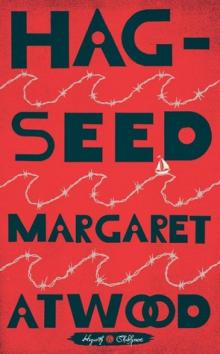 Hag-Seed
Hag-Seed Oryx and Crake
Oryx and Crake The Heart Goes Last
The Heart Goes Last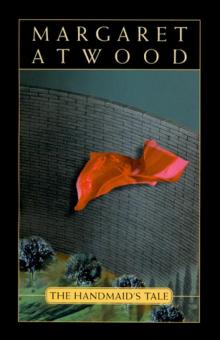 The Handmaid's Tale
The Handmaid's Tale Lady Oracle
Lady Oracle Good Bones and Simple Murders
Good Bones and Simple Murders The Robber Bride
The Robber Bride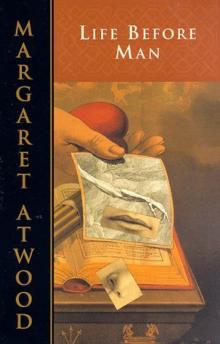 Life Before Man
Life Before Man Alias Grace
Alias Grace The Blind Assassin
The Blind Assassin Cat's Eye
Cat's Eye The Testaments
The Testaments The Penelopiad
The Penelopiad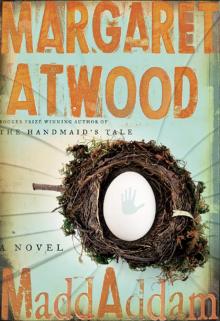 MaddAddam
MaddAddam Dancing Girls & Other Stories
Dancing Girls & Other Stories On Writers and Writing
On Writers and Writing Selected Poems II (1976-1986)
Selected Poems II (1976-1986) Wilderness Tips
Wilderness Tips Dearly
Dearly The Tent
The Tent Bluebeard's Egg
Bluebeard's Egg The Edible Woman
The Edible Woman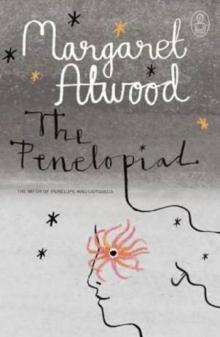 The Penelopiad: The Myth of Penelope and Odysseus
The Penelopiad: The Myth of Penelope and Odysseus Good Bones
Good Bones I Dream of Zenia with the Bright Red Teeth
I Dream of Zenia with the Bright Red Teeth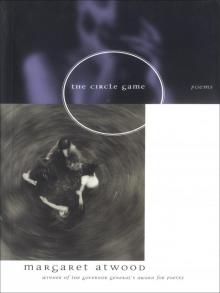 Circle Game
Circle Game Choke Collar: Positron, Episode Two
Choke Collar: Positron, Episode Two Stone Mattress: Nine Tales
Stone Mattress: Nine Tales The MaddAddam Trilogy
The MaddAddam Trilogy Stone Mattress
Stone Mattress Power Politics
Power Politics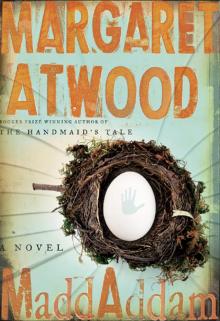 MaddAddam 03 - MaddAddam
MaddAddam 03 - MaddAddam I’m Starved for You (Kindle Single)
I’m Starved for You (Kindle Single) Murder in the Dark
Murder in the Dark In Other Worlds
In Other Worlds Dancing Girls
Dancing Girls Moral Disorder
Moral Disorder